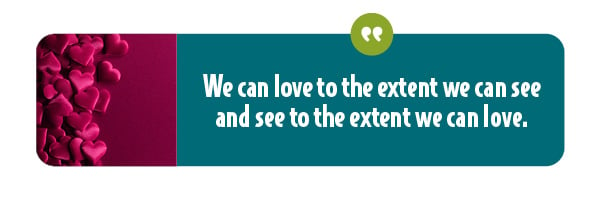Our brains, human behavior, and conditioning have always been a great fascination for me. Every single person is unique, giving them a distinct perspective. Each person sees life differently based on temperament, personality, and past experiences. Not just through their experiences but what conclusions they draw from their experiences.
Perspective is a lever to extract lessons and encouragement. What an incredible opportunity we have to learn empathy and understanding when life throws us some hard knocks.
Estimated reading time: 5 minutes
It's true...we all live in a private little universe. No matter how close we become to another human being, we can never truly know what another person feels and experiences. In fact, a silly little thing called priming prevents us from viewing others accurately. Let me tell you a personal story that illustrates a blindspot of mine.
How We Perceive Our Experience Colors Our Reality
When I first moved into my first Heartmanity Center in Bozeman, I had a lot of fun furnishing it while also getting acquainted with my new neighbors. Typically, I parked in the back of the building for easy access, and there was a handy set of stairs that came directly up to my office.
For the first couple of weeks, I tried to use the back stairs to the second floor, but the door handle wouldn’t turn or budge, so I started using the center stairwell, assuming that the door was kept locked.
After a few weeks, I was leaving after work with another woman, and she zipped over to the back stairway. I walked with her while lamenting that I had stopped using this stairwell because the door was usually locked. She smiled wryly and said, “This is a stationary handle. It doesn’t turn—just push the door.”
It was definitely a “duh” moment. However, the first-floor door handle TURNED. And my office door TURNED. And the doors and handles were exactly alike! So I had expected the handle to turn on the second-floor stairwell.
A recent and insightful Inc. article illustrates how powerful private realities are and how they impact our relationships.
Related reading: "5 Ways Brain Fitness and Behavioral Health Are Optimized by Healthy Habits."
Our Perception Coupled with Priming Influence Our Conclusions
It never ceases to amaze me how small blindspots limit our perception and conclusions while how quickly we are conditioned to believe a certain way. This filtering is what is called psychological priming.
The fact is that every moment, our brains are filling in the gaps and prioritizing pieces of our present observations based on prior experiences. As we constantly try to make sense of the world, we often miss little bits of critical information for living a life of ease and happiness.
The above story illustrates how one tiny fact escaped me and caused me to draw a false conclusion. After all, the door handle on the first floor and the door handle to my office turned—the same kind of heavy door, same wood, same style handle. My brain had drawn an inaccurate conclusion based on my experience.
We create our experience and the quality of our lives by our perception.
Perception defines our reality and determines the quality of our experience and how we feel.
How we perceive our spouse’s tone and glance depends largely on conditioned perceptions and what we have decided before that exchange. How we perceive our child's behavior is largely influenced by whether or not they've misbehaved recently or already have a pattern of behavior. Just as I had concluded the second-floor doors to the back stairwell in my office building were locked, we often decide things about people, the world, and ourselves that are inaccurate.
Part of my work with clients and organizations is to help them remove their blinders and the filters that interfere with seeing the world with fresh eyes to gain greater self-awareness.
Years ago, I read a short story (perhaps in Reader’s Digest) that is so relevant here. Two men traveled to India, representing a shoe company. The first salesperson called back to the States and said, “No sales opportunity; no one wears shoes here.” The second salesperson called and reported, “No one wears shoes here. Unlimited opportunity to sell shoes!” Life is a lot like this story.
What we see is what we get.
 Do you perceive your marriage or your partner in a way that may be limiting love or intimacy?
Do you perceive your marriage or your partner in a way that may be limiting love or intimacy?
What label have you formed in your mind (conditioning) about your child or teen at home or in your classroom that could be hindering a more respectful, loving relationship? (I.e., your teen is trying to make life hard for you or teenage rebellion is normal.)
How are you framing other people's behavior incorrectly?
What are you telling yourself that may be untrue and is creating stress or a lack of confidence at work? (I.e., a co-worker doesn't like you or your boss thinks you take too long on projects.)
 We all wear blinders; it's a part of being human. It’s one of those efficiencies of the brain that require greater mindfulness. This unconscious conditioning requires us to hit our refresh or reload button consistently. Why? Because everything you do repeatedly gets put on autopilot for greater efficiency by the brain!
We all wear blinders; it's a part of being human. It’s one of those efficiencies of the brain that require greater mindfulness. This unconscious conditioning requires us to hit our refresh or reload button consistently. Why? Because everything you do repeatedly gets put on autopilot for greater efficiency by the brain!
Complaining can become a habit of negativity. If you look at yourself, your life, your job, your teen or your spouse negatively, chances are you won't be as happy.
And the more you look for what's wrong, the more you'll find them. Then, collecting evidence to confirm what you suspect becomes an unhelpful habit or “primer.”
Try shifting to a positive perspective.
Mindfully examine how you're summing up experiences throughout the day.
- Set a positive intention for the day when you wake up.
- When you catch yourself being negative, think of three more optimistic conclusions.
- Name three things in the evening you did well today.
- Validate your teen for their steadfastness in soccer or basketball even though the season is demanding.
- Cuddle up with your partner and let them know how much you care. If they've been working too much, don't rag on them; instead, tell them how much you miss them. Then set up a date night!
Changing our perception is as simple as changing channels on a radio or TV. It just takes a moment, but it takes regular practice.
What channel do you want to be experiencing in your life? And what door will you open that you thought was locked?
For a life coach or relationship strategist, contact Heartmanity. Transforming lives is our business!










